- Home
- Clive Barker
Imajica: Annotated Edition Page 2
Imajica: Annotated Edition Read online
Page 2
The other matter I’d like to address is my motivation for writing the novel. Of course there is no simply encapsulated answer to that question, but I will offer here what clues I can. To begin with, I have an abiding interest in the notion of parallel dimensions, and the influence they may exercise over the lives we live in this world. I don’t doubt that the reality we occupy is but one of many; that a lateral step would deliver us into a place quite other. Perhaps our lives are also going on in these other dimensions, changed in vast or subtle ways. Or perhaps these other places will be unrecognizable to us: they’ll be realms of spirit, or wonderlands, or hells. Perhaps all of the above. Imajica is an attempt to create a narrative which explores those possibilities.
It is also a book about Christ. People are constantly surprised that the figure of Jesus is of such importance to me. They look at The Hellbound Heart or at some of the stories in the Books of Blood and take me for a pagan who views Christianity as a pretty distraction from the business of suffering and dying. There is some truth in this. I certainly find the hypocritical cant and derisive dogmas of organized religion grotesque and oftentimes inhumane. Plainly, the Vatican, for instance, cares more for its own authority than for the planet and the flock that grazes upon it. But the mythology that is still barely visible beneath the centuries-old encrustation of power plays and rituals — the story of Jesus the crucified and resurrected; the shaman healer who walked on water and raised Lazarus — is as moving to me as any story I have ever heard.
I found Christ as I found Dionysus or Coyote — through art. Blake showed him to me; so did Bellini and Gerard Manley Hopkins, and half a hundred others, each artist offering his or her own particular interpretation. And from very early on I wanted to find a way to write about Jesus myself; to fold his presence into a story of my own invention. It proved difficult. Most fantastique fiction has drawn inspiration from a pre-Christian world, retrieving from Faery, or Atlantis, or dreams of a Celtic twilight creatures that never heard of Communion. There’s nothing wrong with that, of course, but it always left me wondering if these authors weren’t willfully denying their Christian roots out of frustration or disappointment. Having had no religious education, I harbored no such disappointment: I was drawn to the Christ figure as I was to Pan or Shiva, because the stories and images enlightened and enriched me. Christ is, after all, the central figure of Western mythology. I wanted to feel that my self-created pantheon could accommodate him, that my inventions were not too brittle to bear the weight of his presence.
I was further motivated by a desire to snatch this most complex and contradictory mystery from the clammy hands of the men who have claimed it for their own in recent years, especially here in America. The Falwells and the Robertsons, who, mouthing piety and sowing hatred, use the Bible to justify their plots against our self-discovery. Jesus does not belong to them. And it pains me that many imaginative people are so persuaded by these claims to possession that they turn their backs on the body of Western mysticism instead of reclaiming Christ for themselves. I said in an interview once (and meant it) that the Pope, or Falwell, or a thousand others, may announce that God talks to them, instructs them, shows them the Grand Plan, but that the Creator talks to me just as loudly, just as cogently, through the images and ideas He, She, or It has seeded in my imagination.
That said, I must tell you that the deeper I got into writing Imajica, the more certain I became that completing it was beyond me. I have never come closer to giving up as I came on this book, never doubted more deeply my skills as a storyteller, was never more lost, never more afraid. But nor was I ever more obsessed. I became so thoroughly immersed in the narrative that for a period of several weeks toward the end of the final draft a kind of benign insanity settled upon me. I woke from dreams of the Dominions only to write about them until I crept back to bed to dream them again. My ordinary life — what little I had — came to seem banal and featureless by contrast with what was happening to me — I should say Gentle, but I mean me — as we made our journey toward revelation.
It’s no accident that the book was finished as I prepared to leave England for America. By the time I came to write the final pages, my house in Wimpole Street had been sold, its contents boxed up and sent on to Los Angeles, so that all I had that I took comfort in had gone from around me. It was in some ways a perfect way to finish the novel: like Gentle, I was embarking on another kind of life, and in so doing leaving the country in which I had spent almost forty years. In a sense, Imajica became a compendium of locations I had known and felt strongly about: Highgate and Crouch End, where I had spent a decade or more, writing plays, then short stories, then Weaveworld; Central London, where I lived for a little time in a splendid Georgian house. There on the page I put the summers of my childhood, and my fantasies of aristocracy. I put my love of a peculiar English apocalyptic: the visions of Stanley Spencer and John Martin and William Blake, dreams of domestic resurrection and Christ upon the doorstep some summer morning. Gamut Street I placed in Clerkenwell, which has always seemed haunted to me. The scenes with the returned Gentle I set on the South Bank, where I had spent many blissful evenings. In short, the book became my farewell to England.
I do not discount the possibility that I will one day return there, of course, but for now, in the smog and sun of Los Angeles, that world seems very remote. It’s extraordinary how divided it can make you feel, having been brought up in one country and coming to live in another. For a writer such as myself, who is much concerned with journeys into the strange, and the melancholia and joy of such journeys, it’s proved an educative experience.
I offer these scraps of biography in the hope that they illuminate the story that follows, and that some of the feelings that brought me to this novel will be left with you when it’s finished. Christ and England have not left my heart of course — they never will — but writing about a subject works an extraordinary magic. It magnifies the passions that inspired the story, and then — with the work finished — buries them, out of sight and mind, so as to allow the writer to move on to another place. I still dream of England, now and then, and I last wrote of Jesus walking on Quiddity’s waters in Everville, telling Tesla Bombeck that “lives are leaves on the story-tree.” But I will never again feel about them as I did when I wrote Imajica. Those particular forms and emotions have disappeared into the pages, to be rediscovered there by somebody who wants to find them. If it pleases you to do so, make them your own.
Dream the rest
A sequel to Imajica just doesn’t seem possible to me. It is my favourite amongst my books. But it ends with the hero beginning on a journey of salvation that I’m not sure I would ever want to set to words. Sometimes it’s just best to allow readers like yourself to dream the rest.
From an AOL chat, September 1, 1995.
Some of the material in this section is also collected in Clive Barker: Revelations, an online publication devoted to Barkerania and located at www.clivebarker.dial.pipex.com.
One
IT WAS THE PIVOTAL teaching of Pluthero Quexos, the most celebrated dramatist of the Second Dominion, that in any fiction, no matter how ambitious its scope or profound its theme, there was only ever room for three players. Between warring kings, a peacemaker; between adoring spouses, a seducer or a child. Between twins, the spirit of the womb. Between lovers, Death. Greater numbers might drift through the drama, of course—thousands in fact—but they could only ever be phantoms, agents, or, on rare occasions, reflections of the three real and self-willed beings who stood at the center. And even this essential trio would not remain intact; or so he taught. It would steadily diminish as the story unfolded, three becoming two, two becoming one, until the stage was left deserted.
Needless to say, this dogma did not go unchallenged. The writers of fables and comedies were particularly vociferous in their scorn, reminding the worthy Quexos that they invariably ended their own tales with a marriage and a feast. He was unrepentant. He dubbed them cheats and told them th
ey were swindling their audiences out of what he called the last great procession, when, after the wedding songs had been sung and the dances danced, the characters took their melancholy way off into darkness, following each other into oblivion.
It was a hard philosophy, but he claimed it was both immutable and universal, as true in the Fifth Dominion, called Earth, as it was in the Second.
And more significantly, as certain in life as it was in art.
Being a man of contained emotion, Charlie Estabrook had little patience with the theater. It was, in his bluntly stated opinion, a waste of breath: indulgence, flummery, lies. But had some student recited Quexos’ First Law of Drama to him this cold November night he would have nodded grimly and said: All true, all true. It was his experience precisely. Just as Quexos’ Law required, his story had begun with a trio: himself, John Furie Zacharias, and, between them, Judith. That arrangement hadn’t lasted very long. Within a few weeks of setting eyes on Judith he had managed to supersede Zacharias in her affections, and the three had dwindled to a blissful two. He and Judith had married and lived happily for five years, until, for reasons he still didn’t understand, their joy had foundered, and the two had become one.
He was that one, of course, and the night found him sitting in the back of a purring car being driven around the frosty streets of London in search of somebody to help him finish the story. Not, perhaps, in a fashion Quexos would have approved of—the stage would not be left entirely empty—but one which would salve Estabrook’s hurt.
He wasn’t alone in his search. He had the company of one half-trusted soul tonight: his driver, guide, and procurer, the ambiguous Mr. Chant. But despite Chant’s shows of empathy, he was still just another servant, content to attend upon his master as long as he was promptly paid. He didn’t understand the profundity of Estabrook’s pain; he was too chilly, too remote. Nor, for all the length of his family history, could Estabrook turn to his lineage for comfort. Although he could trace his ancestors back to the reign of James the First, he had not been able to find a single man on that tree of immoralities—even to the bloodiest root—who had caused, either by his hand or hiring, what he, Estabrook, was out this midnight to contrive: the murder of his wife.
When he thought of her (when didn’t he?) his mouth was dry and his palms were wet; he sighed; he shook. She was in his mind’s eye now, like a fugitive from some more perfect place. Her skin was flawless and always cool, always pale; her body was long, like her hair, like her fingers, like her laughter; and her eyes, oh, her eyes, had every season of leaf in them: the twin greens of spring and high summer, the golds of autumn, and, in her rages, black midwinter rot.
He was, by contrast, a plain man: well scrubbed but plain. He’d made his fortune selling baths, bidets, and toilets, which lent him little by way of mystique. So, when he’d first laid eyes on Judith—she’d been sitting behind a desk at his accountant’s office, her beauty all the more luminous for its drab setting—his first thought was: I want this woman; his second: She won’t want me. There was, however, an instinct in him when it came to Judith that he’d never experienced with any other woman. Quite simply, he felt she belonged to him, and that if he turned his wit to it, he could win her.
His courtship had begun the day they’d met, with the first of many small tokens of affection delivered to her desk. But he sooned learned that such bribes and blandishments would not help his case. She politely thanked him but told him they weren’t welcome. He dutifully ceased to send presents and, instead, began a systematic investigation of her circumstances. There was precious little to learn. She lived simply, her small circle vaguely bohemian. But among that circle he discovered a man whose claim upon her preceded his own, and to whom she was apparently devoted. That man was John Furie Zacharias, known universally as Gentle, and he had a reputation as a lover that would have driven Estabrook from the field had that strange certainty not been upon him. He decided to be patient and await his moment. It would come.
Meanwhile he watched his beloved from afar, conspiring to encounter her accidentally now and again, and researching his antagonist’s history. Again, there was little to learn. Zacharias was a minor painter, when he wasn’t living off his mistresses, and reputedly a dissolute. Of this Estabrook had perfect proof when, by chance, he met the fellow. Gentle was as handsome as his legends suggested, but looked, Charlie thought, like a man just risen from a fever. There was something raw about him—his body sweated to its essence, his face betraying a hunger behind its symmetry—that lent him a bedeviled look.
Half a week after that encounter, Charlie had heard that his beloved had parted from the man with great grief and was in need of tender care. He’d been quick to supply it, and she’d come into the comfort of his devotion with an ease that suggested his dreams of possession had been well founded.
His memories of that triumph had, of course, been soured by her departure, and now it was he who wore the hungry, yearning look he’d first seen on Furie’s face. It suited him less well than it had Zacharias. His was not a head made for haunting. At fifty-six, he looked sixty or more, his features as solid as Gentle’s were spare, as pragmatic as Gentle’s were rarefied. His only concession to vanity was the delicately curled mustache beneath his patrician nose, which concealed an upper lip he’d thought dubiously ripe in his youth, leaving the lower to jut in lieu of a chin.
Now, as he rode through the darkened streets, he caught sight of that face in the window and perused it ruefully. What a mockery he was! He blushed to think of how shamelessly he’d paraded himself when he’d had Judith on his arm; how he’d joked that she loved him for his cleanliness, and for his taste in bidets. The same people who’d listened to those jokes were laughing in earnest now, were calling him ridiculous. It was unbearable. The only way he knew to heal the pain of his humiliation was to punish her for the crime of leaving him.
He rubbed the heel of his hand against the window and peered out.
“Where are we?” he asked Chant.
“South of the river, sir.”
“Yes, but where?”
“Streatham.”
Though he’d driven through this area many times—he had a warehouse in the neighborhood—he recognized none of it. The city had never looked more foreign or more unlovely.
“What sex is London, do you suppose?” he mused.
“I hadn’t ever thought,” Chant said.
“It was a woman once,” Estabrook went on. “One calls a city she, yes? But it doesn’t seem very feminine anymore.”
“She’ll be a lady again in spring,” Chant replied.
“I don’t think a few crocuses in Hyde Park are going to make much difference,” Estabrook said. “The charm’s gone out of it.” He sighed. “How far now?”
“Maybe another mile.”
“Are you sure your man’s going to be there?”
“Of course.”
“You’ve done this a lot, have you? Been a go-between, I mean. What did you call it . . . a facilitator?”
“Oh, yes,” Chant said. “It’s in my blood.” That blood was not entirely English. Chant’s skin and syntax carried traces of the immigrant. But Estabrook had grown to trust him a little, even so.
“Aren’t you curious about all of this?” he asked the man.
“It’s not my business, sir. You’re paying for the service, and I provide it. If you wanted to tell me your reasons—”
“As it happens, I don’t.”
“I understand. So it would be useless for me to be curious, yes?”
That was neat enough, Estabrook thought. Not to want what couldn’t be had no doubt took the sting from things. He might need to learn the trick of that before he got too much older; before he wanted time he couldn’t have. Not that he demanded much in the way of satisfactions. He’d not been sexually insistent with Judith, for instance. Indeed, he’d taken as much pleasure in the simple sight of her as he’d taken in the act of love. The sight of her had pierced him, making her the ent
erer, had she but known it, and him the entered. Perhaps she had known, on reflection. Perhaps she’d fled from his passivity, from his ease beneath the spike of her beauty. If so, he would undo her revulsion with tonight’s business. Here, in the hiring of the assassin, he would prove himself. And, dying, she would realize her error. The thought pleased him. He allowed himself a little smile, which vanished from his face when he felt the car slowing and glimpsed, through the misted window, theplace the facilitator had brought him to.
A wall of corrugated iron lay before them, its length daubed with graffiti. Beyond it, visible through gaps where the iron had been torn into ragged wings and beaten back, was a junkyard in which trailers were parked. This was apparently their destination.
“Are you out of your mind?” he said, leaning forward to take hold of Chant’s shoulder. “We’re not safe here.”
“I promised you the best assassin in England, Mr. Estabrook, and he’s here. Trust me, he’s here.”
Estabrook growled in fury and frustration. He’d expected a clandestine rendezvous—curtained windows, locked doors—not a gypsy encampment. This was altogether too public and too dangerous. Would it not be the perfect irony to be murdered in the middle of an assignation with an assassin?
He leaned back against the creaking leather of his seat and said, “You’ve let me down.”

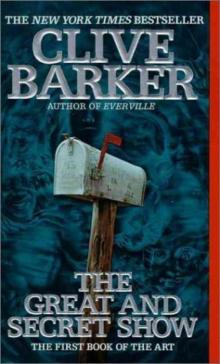 The Great and Secret Show
The Great and Secret Show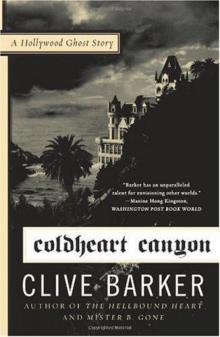 Coldheart Canyon: A Hollywood Ghost Story
Coldheart Canyon: A Hollywood Ghost Story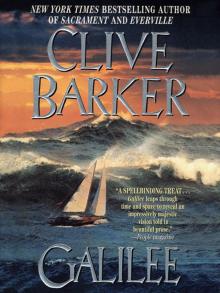 Galilee
Galilee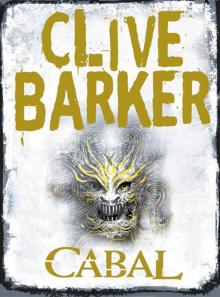 Cabal
Cabal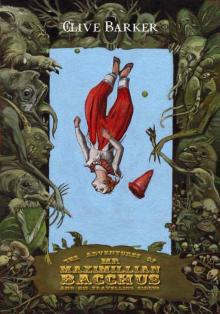 The Adventures of Mr. Maximillian Bacchus and His Travelling Circus
The Adventures of Mr. Maximillian Bacchus and His Travelling Circus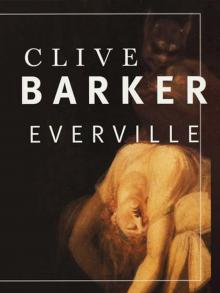 Everville
Everville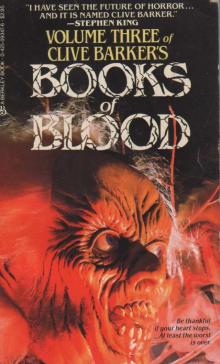 Books of Blood: Volume Three
Books of Blood: Volume Three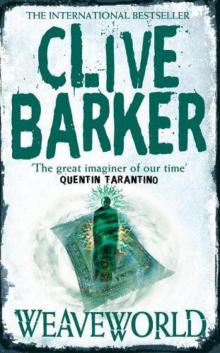 Weaveworld
Weaveworld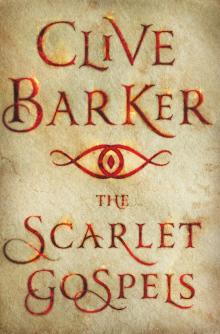 The Scarlet Gospels
The Scarlet Gospels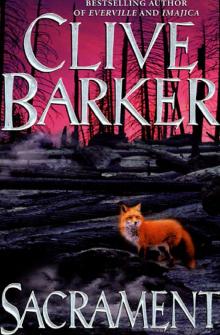 Sacrament
Sacrament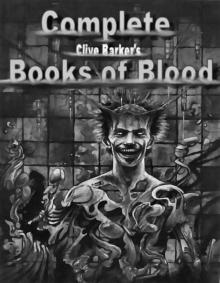 Books of Blood: Volumes 1-6
Books of Blood: Volumes 1-6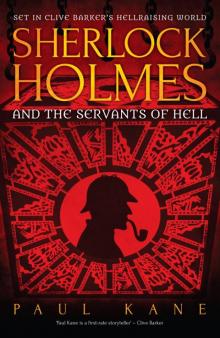 Sherlock Holmes and the Servants of Hell
Sherlock Holmes and the Servants of Hell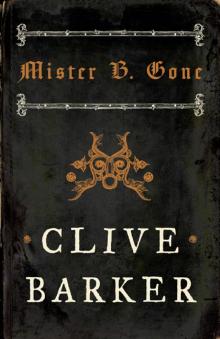 Mister B. Gone
Mister B. Gone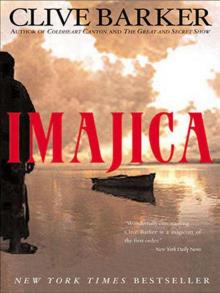 Imajica
Imajica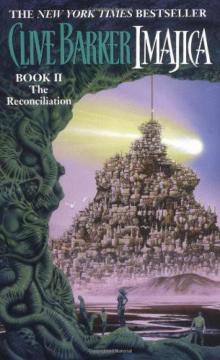 The Reconciliation
The Reconciliation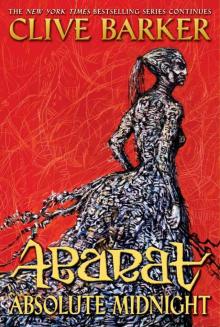 Abarat
Abarat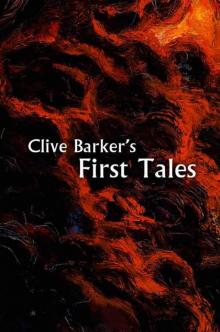 Clive Barker's First Tales
Clive Barker's First Tales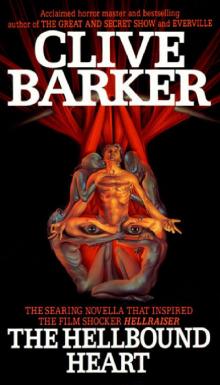 The Hellbound Heart
The Hellbound Heart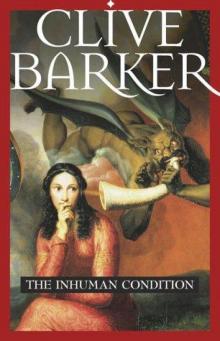 The Inhuman Condition
The Inhuman Condition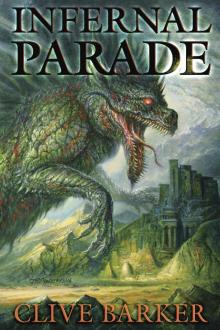 Infernal Parade
Infernal Parade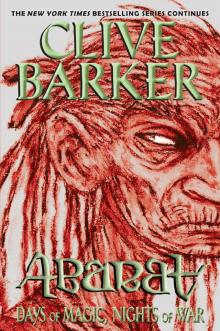 Days of Magic, Nights of War
Days of Magic, Nights of War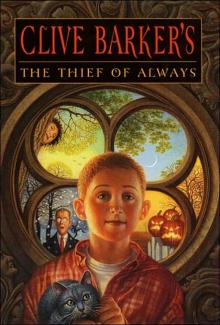 The Thief of Always
The Thief of Always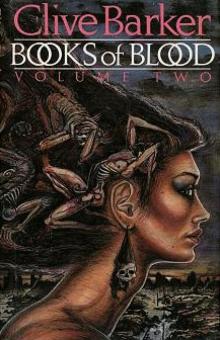 Books of Blood Vol 2
Books of Blood Vol 2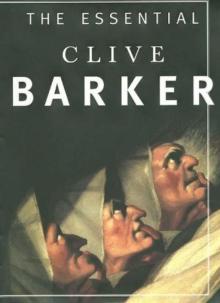 The Essential Clive Barker
The Essential Clive Barker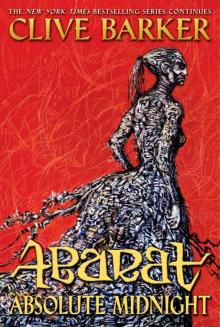 Abarat: Absolute Midnight a-3
Abarat: Absolute Midnight a-3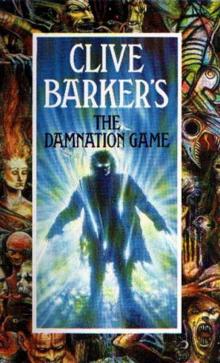 The Damnation Game
The Damnation Game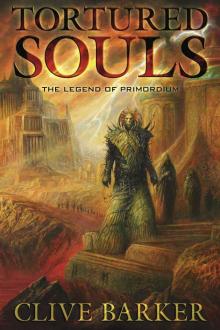 Tortured Souls: The Legend of Primordium
Tortured Souls: The Legend of Primordium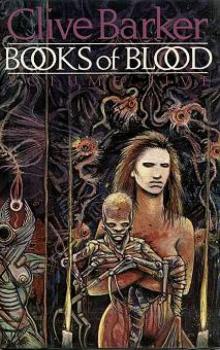 Books of Blood Vol 5
Books of Blood Vol 5 Imajica 02 - The Reconciliator
Imajica 02 - The Reconciliator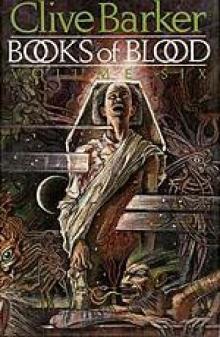 Books Of Blood Vol 6
Books Of Blood Vol 6 Imajica 01 - The Fifth Dominion
Imajica 01 - The Fifth Dominion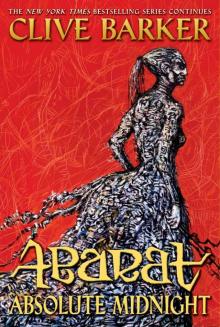 Abarat: Absolute Midnight
Abarat: Absolute Midnight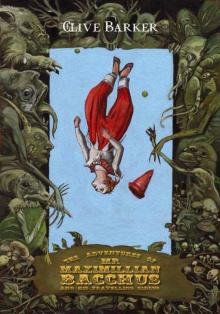 The Adventures of Mr. Maximillian Bacchus & His Traveling Circus
The Adventures of Mr. Maximillian Bacchus & His Traveling Circus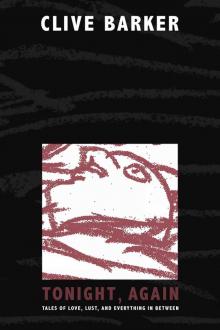 Tonight, Again
Tonight, Again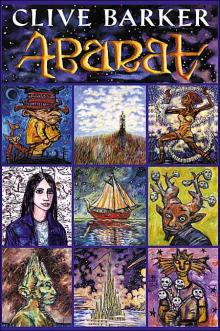 Abarat: The First Book of Hours a-1
Abarat: The First Book of Hours a-1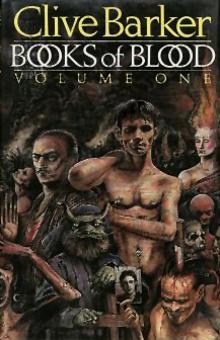 Books Of Blood Vol 1
Books Of Blood Vol 1 Age of Desire
Age of Desire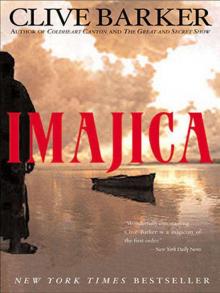 Imajica: Annotated Edition
Imajica: Annotated Edition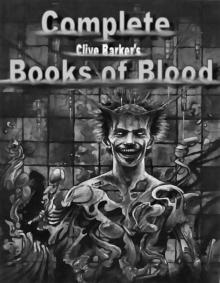 Complete Books of Blood
Complete Books of Blood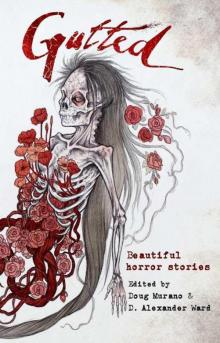 Gutted: Beautiful Horror Stories
Gutted: Beautiful Horror Stories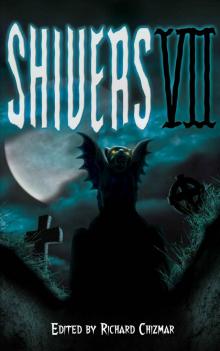 Shivers 7
Shivers 7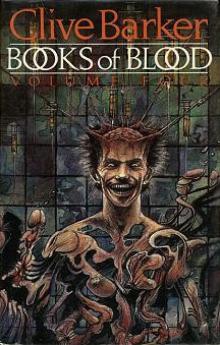 Books Of Blood Vol 4
Books Of Blood Vol 4